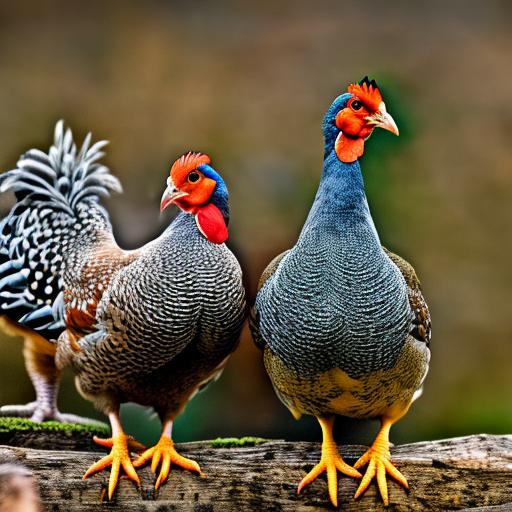Keeping chickens and guinea fowl together can be a rewarding and beneficial experience for poultry enthusiasts. Both chickens and guinea fowl are popular choices for backyard flocks due to their ability to provide fresh eggs, pest control, and companionship. However, it is important to understand the characteristics of each species and the potential challenges that may arise when keeping them together.
Personally, I have had experience keeping chickens and guinea fowl together in my backyard flock. I found that they complemented each other well and provided a diverse range of benefits. In this article, I will share my insights on the topic and provide information on how to successfully keep chickens and guinea fowl together.
Key Takeaways
- Keeping chickens and guinea fowl together can be a great way to diversify your flock and increase the benefits of backyard poultry keeping.
- Chickens and guinea fowl have different characteristics, with guinea fowl being more independent and better at foraging, while chickens are more social and better at laying eggs.
- Benefits of keeping chickens and guinea fowl together include pest control, increased egg production, and entertainment value.
- Potential challenges include aggression and disease transmission, which can be managed through proper housing, feeding, and health practices.
- Housing requirements for chickens and guinea fowl should provide ample space, shelter, and protection from predators, with separate roosting areas to prevent aggression.
Understanding the Characteristics of Chickens and Guinea Fowl
Chickens and guinea fowl have distinct differences in behavior and temperament. Chickens are generally more docile and social, while guinea fowl are known for their alertness and tendency to be more independent. Chickens are often seen scratching the ground for insects and worms, while guinea fowl are known for their excellent pest control abilities, as they actively hunt and consume insects.
When kept together, chickens and guinea fowl can interact in various ways. Chickens may initially be curious about the guinea fowl, while the guinea fowl may be more cautious and wary of their new flock mates. Over time, they can develop a sense of camaraderie and establish a pecking order within the flock.
Benefits of Keeping Chickens and Guinea Fowl Together
One of the main benefits of keeping chickens and guinea fowl together is pest control. Guinea fowl are excellent at hunting insects, ticks, and other pests that can be harmful to both humans and poultry. They have a keen sense of sight and hearing, making them effective at detecting pests in the surrounding area. By allowing guinea fowl to roam freely with chickens, you can significantly reduce the pest population in your yard.
Another benefit of keeping chickens and guinea fowl together is companionship. Chickens are social animals and enjoy the company of other birds. Guinea fowl, although more independent, can still provide a sense of companionship to the flock. They can also act as an early warning system, alerting the chickens to potential dangers such as predators.
Additionally, keeping chickens and guinea fowl together can lead to increased egg production. Guinea fowl are known for their prolific egg-laying abilities, and their presence in the flock can encourage chickens to lay more eggs as well. This can be advantageous for those who are looking to have a steady supply of fresh eggs.
Potential Challenges of Keeping Chickens and Guinea Fowl Together
While there are many benefits to keeping chickens and guinea fowl together, there are also potential challenges that need to be considered. One challenge is aggression between the two species. Chickens and guinea fowl have different temperaments, and this can sometimes lead to conflicts within the flock. It is important to monitor their interactions closely and intervene if necessary to prevent any serious injuries.
Another challenge is the difference in dietary needs between chickens and guinea fowl. Chickens require a balanced diet that includes grains, protein, and calcium for egg production. Guinea fowl, on the other hand, have higher protein requirements and need a diet that includes more insects and greens. It is important to provide appropriate nutrition for both species to ensure their health and well-being.
Disease transmission is also a potential concern when keeping chickens and guinea fowl together. While both species can be susceptible to certain diseases, they may have different levels of resistance or immunity. It is important to practice good biosecurity measures, such as regular cleaning and disinfection of the coop, to minimize the risk of disease transmission.
Housing Requirements for Chickens and Guinea Fowl
When keeping chickens and guinea fowl together, it is important to provide adequate housing to meet the needs of both species. The coop and run should be spacious enough to accommodate the flock comfortably. A general rule of thumb is to provide at least 4 square feet of coop space per chicken and 6-8 square feet of run space per bird.
Nesting boxes and roosting bars should also be provided for both chickens and guinea fowl. Chickens prefer nesting boxes that are dark, quiet, and secluded, while guinea fowl may prefer open nesting areas. Roosting bars should be placed at different heights to accommodate the different sizes and preferences of both species.
Water and food sources should be easily accessible for both chickens and guinea fowl. It is important to provide separate feeders for each species to ensure that they receive the appropriate diet. Waterers should be kept clean and filled with fresh water at all times.
Feeding Chickens and Guinea Fowl Together

Feeding chickens and guinea fowl together can be a bit challenging due to their different dietary needs. Chickens require a balanced diet that includes grains, protein, and calcium for egg production. Guinea fowl, on the other hand, have higher protein requirements and need a diet that includes more insects and greens.
To provide appropriate nutrition for both species, it is recommended to offer a high-quality poultry feed that is suitable for both chickens and guinea fowl. This feed should contain a balanced mix of grains, protein, vitamins, and minerals. Additionally, it is important to supplement their diet with fresh greens, fruits, vegetables, and insects to meet their specific nutritional needs.
Health Concerns and Disease Prevention for Chickens and Guinea Fowl
Both chickens and guinea fowl can be susceptible to certain diseases and illnesses. Common diseases that can affect both species include respiratory infections, parasites, and viral infections. It is important to practice good biosecurity measures to prevent the spread of diseases within the flock.
Regular cleaning and disinfection of the coop and run are essential to minimize the risk of disease transmission. It is also important to provide a clean and dry environment for both chickens and guinea fowl. Regular health checks should be conducted to monitor the overall well-being of the flock.
Managing Aggression and Pecking Order Among Chickens and Guinea Fowl
Aggression can sometimes occur between chickens and guinea fowl, especially during the initial introduction period. To reduce aggression, it is recommended to introduce new birds gradually and provide plenty of space for each bird to establish their territory. Providing multiple feeding and watering stations can also help reduce competition and aggression.
Establishing a pecking order is a natural behavior among chickens and guinea fowl. It is important to allow them to establish their hierarchy without interfering too much. However, if aggression becomes excessive or results in serious injuries, it may be necessary to separate the birds temporarily or permanently.
Breeding Chickens and Guinea Fowl Together
Chickens and guinea fowl can breed with each other, although it is not very common. The resulting offspring, known as guin-hens or guin-cocks, will have characteristics of both species. They may have the body shape and size of a chicken but display some traits of guinea fowl, such as their coloration or vocalizations.
If you are interested in breeding chickens and guinea fowl together, it is important to consider the potential challenges that may arise. The offspring may have different dietary needs or temperaments compared to their parents. It is also important to ensure that you have enough space and resources to accommodate the growing flock.
Is Keeping Chickens and Guinea Fowl Together Right for You?
Keeping chickens and guinea fowl together can be a rewarding experience, providing benefits such as pest control, companionship, and increased egg production. However, it is important to consider the potential challenges, such as aggression, dietary differences, and disease transmission.
Before deciding to keep chickens and guinea fowl together, it is important to assess your own resources and capabilities. Do you have enough space to accommodate both species? Are you able to provide appropriate housing, nutrition, and healthcare for both chickens and guinea fowl? These are important factors to consider before making a decision.
Based on my personal experience, I would recommend keeping chickens and guinea fowl together if you have the resources and are willing to put in the necessary effort. The benefits of pest control, companionship, and increased egg production can outweigh the potential challenges if managed properly. With proper planning and care, keeping chickens and guinea fowl together can be a rewarding and enjoyable experience for poultry enthusiasts.
If you’re considering keeping chickens and guinea fowl together, you may be interested in learning more about the ideal chicken coop setup. Poultry Wizard has a helpful article on chicken coop portage, which provides valuable insights into creating a suitable living space for your feathered friends. Understanding the importance of proper housing can ensure the well-being and safety of both chickens and guinea fowl. To read more about this topic, check out the article here.
FAQs
What are chickens and guinea fowl?
Chickens and guinea fowl are both domesticated birds commonly kept for their meat and eggs. Chickens are larger and more commonly kept, while guinea fowl are smaller and less common.
Can chickens and guinea fowl be kept together?
Yes, chickens and guinea fowl can be kept together. However, it is important to introduce them slowly and monitor their interactions to ensure they get along.
What are the benefits of keeping chickens and guinea fowl together?
Keeping chickens and guinea fowl together can provide a variety of benefits, including pest control, increased egg production, and entertainment.
What are the potential problems with keeping chickens and guinea fowl together?
The main potential problem with keeping chickens and guinea fowl together is that they may not get along. Chickens can be aggressive towards guinea fowl, and guinea fowl may be too noisy for some people.
How can you introduce chickens and guinea fowl?
To introduce chickens and guinea fowl, it is best to keep them separated at first and gradually introduce them over a period of several weeks. This allows them to get used to each other’s presence without feeling threatened.
What should you feed chickens and guinea fowl?
Chickens and guinea fowl have similar dietary needs and can be fed a diet of commercial poultry feed supplemented with fresh fruits and vegetables. They also require access to clean water at all times.
What kind of housing do chickens and guinea fowl need?
Chickens and guinea fowl require a secure coop or housing area to protect them from predators and the elements. They also need access to a fenced outdoor area for exercise and foraging.
Meet Walter, the feathered-friend fanatic of Florida! Nestled in the sunshine state, Walter struts through life with his feathered companions, clucking his way to happiness. With a coop that’s fancier than a five-star hotel, he’s the Don Juan of the chicken world. When he’s not teaching his hens to do the cha-cha, you’ll find him in a heated debate with his prized rooster, Sir Clucks-a-Lot. Walter’s poultry passion is no yolk; he’s the sunny-side-up guy you never knew you needed in your flock of friends!







